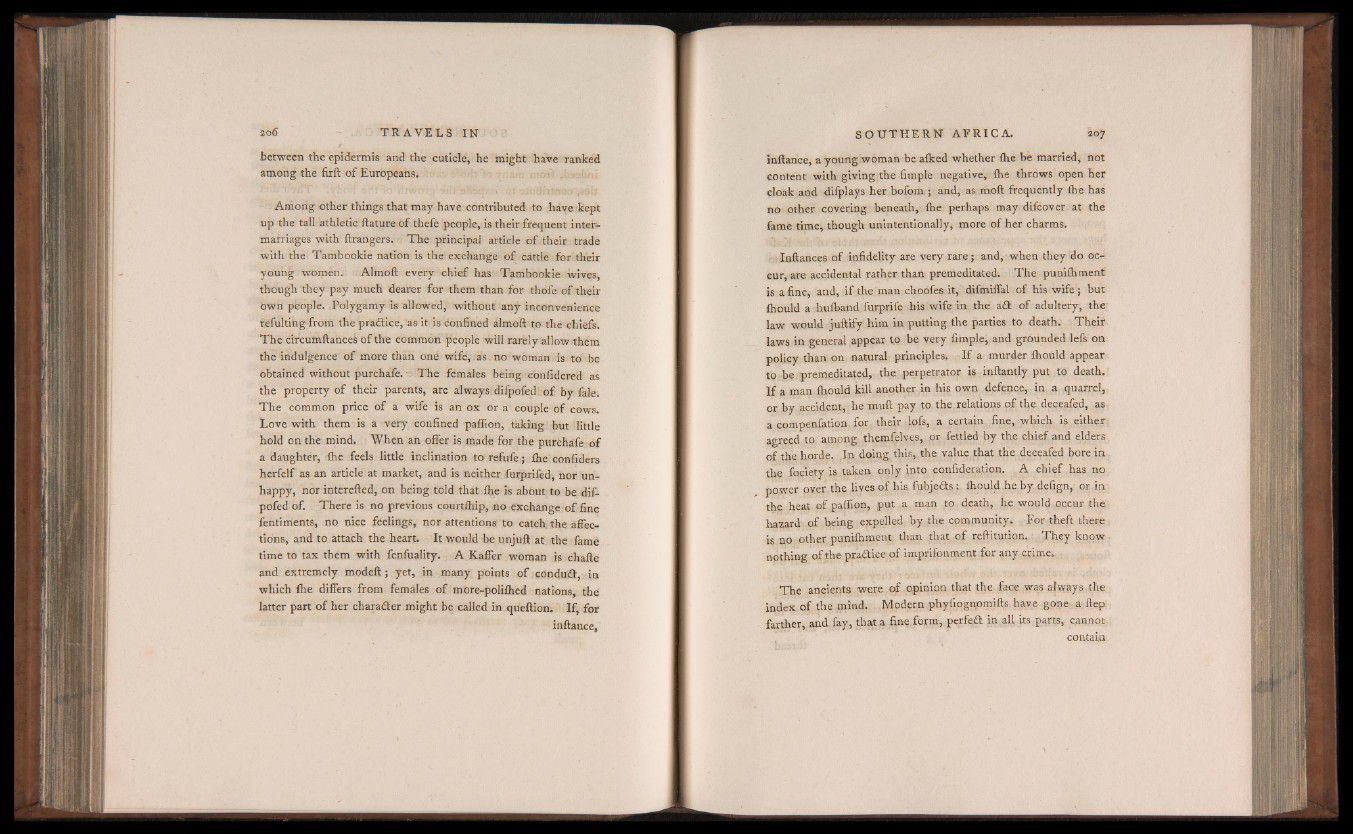
between the epidermis and the cuticle, he might have ranked
among the firft of Europeans,
Among other things that may have contributed to have kept
up the tall athletic ftature o f thefe people, is their frequent intermarriages
with ftrangers. The principal article of their trade
with the Tambookie nation is the exchange o f cattle for their
young women. Almoft every chief has Tambookie wives,
though they pay much dearer for them than for thofe of their
own people. Polygamy is allowed, without any inconvenience
refulting from thepradice, as it is confined almoft to the chiefs.
The circumftances of the common people will rarely allow them
the indulgence of more than one wife, as no woman is to be
obtained without purchafe. * The females being coniidered as
the property of their parents, are always difpofed of by fale.
The common price of a wife is an ox or a couple of cows.
Love with them is a very confined paflion, taking but little
hold on the mind. When an offer is made for the purchafe,of
a daughter, ihe feels little inclination to refufe; ihe confiders
herfelf as an article at market, and is neither furprifed, nor unhappy,
nor interefted, on being told that Ihe is about to be difpofed
of. There is no previous courtlhip, no exchange of fine
fentiments, no nice feelings, nor attentions to catch the affections,
and to attach the heart. It would be unjuft at the fame
time to tax them with fenfuality. A Kaffer woman is chafte
and extremely modeft ; yet, in many points o f conduit, in
which ihe differs from females of more-polilhed nations, the
latter part o f her charader might be called in queftion. If, for
inftauce,
inffance, a young woman beaiked whether ihe be married, not
content with giving the fimple negative, ihe throws open her
cloak and difplays her bofom ; and, as.moft frequently ihe has
no other covering beneath, ihe perhaps may difcover at the
fame time, though unintentionally, more of her charms.
Inftances of infidelity are very rare ; and, when they do occur,
are accidental rather than premeditated. The puniihment
is a fine, and, if the man choofes it, difmiffal of his wife; but
ihould a huiband furprife his wife in the ad o f adultery, the
law would juftify him in putting the parties to death. Their
laws in general appear to be very fimple, and grounded lefs on
policy than on natural principles. I f a murder ihould appear
to be premeditated, the perpetrator is inftantly put to death.
I f a man ihould kill another in his own defence, in a quarrel,
or by accident,: he muft pay to the relations of the deceafed, as
a compeniation for their lofs, a certain rfine, which is either
agreed to among themfelves, or fettled by the chief and elders
of the horde. In doing this, the value that the deceafed bore in
the fociety is taken only into confideration. A chief has no
power over the lives of his fubjeds: ihould he by defign, or in
the heat of paifion, put a man to death, he would occur the
hazard of being expelled by the community. For theft there
is no other puniihment than that of reftitution. j They know
nothing of thepradice of imprifonment for any crime.
The ancients were of opinion that the face was always the
index of the mind. Modern phyfiognomifts have gone a ftep
farther, and fay, that a fine form, perfed in all Its parts, cannot
contain